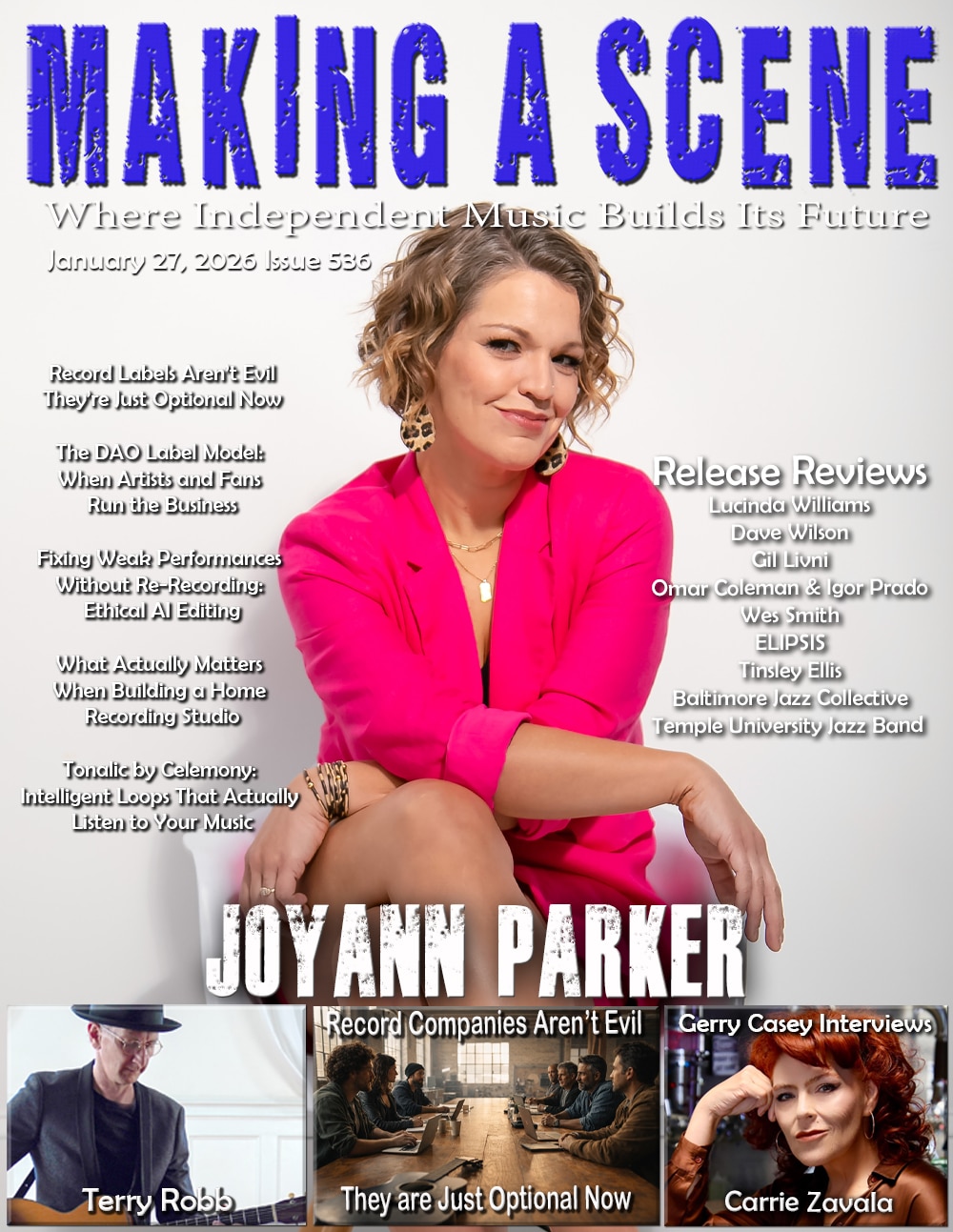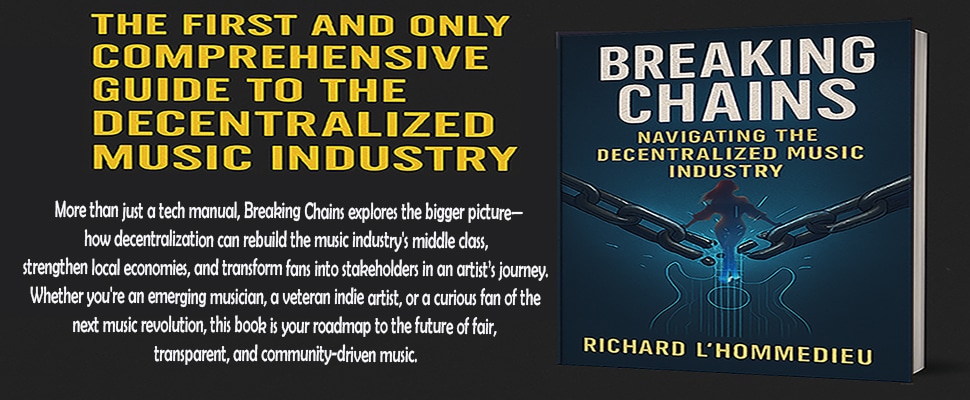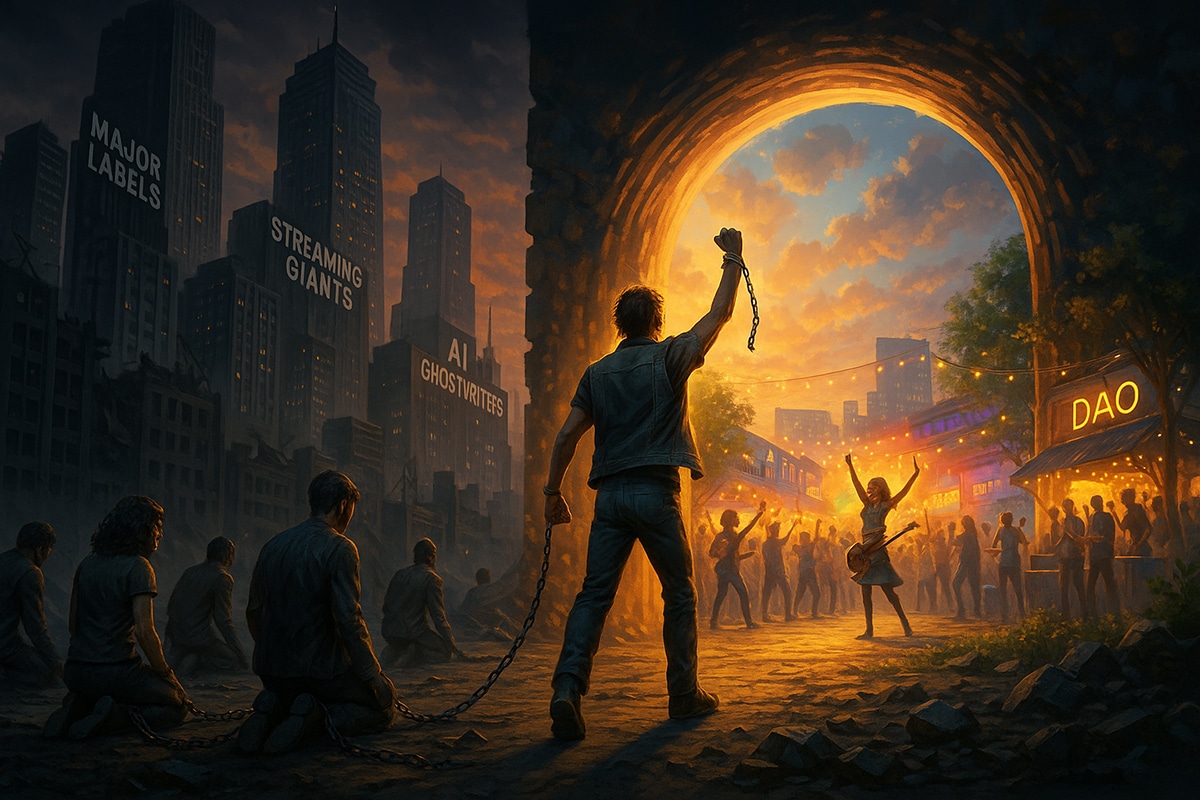Breaking Free: Why Decentralization is the Future for Indie Musicians
Making a Scene Presents Breaking Free: Why Decentralization is the Future for Indie Musicians
For decades, independent musicians have walked a tightrope stretched between creative freedom and the cold realities of an industry designed to control access, dictate value, and monopolize profits. Even as digital platforms promised liberation, many artists soon realized they had simply traded one set of gatekeepers for another. Streaming giants, major labels, and algorithm-driven platforms still determine whose voices are heard—and who gets paid (or more often, underpaid).
Today, though, a revolution is brewing beneath the surface. It’s a movement fueled by blockchain, DAOs, and decentralized streaming — a shift that isn’t just tweaking the system, but rewriting the entire rulebook. For indie musicians, it’s not just about survival anymore; it’s about reclaiming power, ownership, and possibility.
Why Traditional Platforms Are Broken
Let’s be honest: the digital revolution in music didn’t fix the industry’s core problems — it just shifted them into a slicker, app-based format. While it’s easier than ever for indie musicians to upload a song to Spotify or Apple Music, the reality behind the scenes tells a different story. Artists aren’t operating on a level playing field. They’re navigating a game where the rules are hidden, and the odds are stacked against them.
One of the biggest cracks in the system is how royalties are distributed. Recently, Spotify — under pressure from major labels like Universal Music Group (UMG) — introduced a so-called “artist-centric” payment model. Sounds good, right? Except in practice, it means that tracks generating fewer than a thousand streams per year don’t qualify for any payout at all. Most of those tracks belong to indie artists. Instead of helping smaller musicians earn fair compensation, the money that should have been theirs gets funneled back to the major labels, padding the profits of already successful, corporate-backed artists. In other words, the system deliberately takes from the many to enrich the few.
Then there’s Discovery Mode, another policy that hits indie musicians right in the wallet. Discovery Mode offers artists a chance to get more exposure — but at a cost: they must agree to accept lower royalty rates in exchange for better placement in Spotify’s algorithms. This isn’t organic discovery; it’s a pay-to-play scheme dressed up as opportunity. And here’s the kicker: if you don’t opt into Discovery Mode, your tracks may not be promoted at all. This not only slashes indie artists’ income, but it proves that the algorithms are not neutral. They are actively controlled and manipulated by streaming platforms to favor big label content and maximize corporate profits.
The cracks widen further with the rise of ghostwriting and AI-generated music. Streaming platforms have quietly filled many of their passive listening playlists—those “Peaceful Piano,” “Chill Vibes,” or “Deep Focus” lists—with cheap, royalty-light music either created by anonymous ghostwriters or generated entirely by artificial intelligence. These tracks are prioritized in playlists because they cost far less to license than paying out a real indie artist. In essence, the platforms are saturating playlists with low-cost content to maximize their own margins, while squeezing independent musicians even further out of passive discovery pathways.
This practice also exposes a critical truth: the platforms aren’t “serving what listeners want” — they’re engineering what listeners hear based on what’s cheapest and most profitable for them. The idea that algorithms are neutral or purely consumer-driven is a myth. The system is designed to push corporate content first, while genuine artistry gets buried deeper and deeper.
And it doesn’t stop there. Many indie artists report experiencing shadow banning — a form of hidden suppression where their new music stops reaching fans, shows up less in searches, or simply disappears from algorithmic recommendations without explanation. There’s also the issue of underreporting streams, where artists find stream counts mysteriously lower than fan reports or third-party tracking suggest. When algorithms control visibility, and transparency is almost nonexistent, artists are left powerless to challenge these discrepancies.
At its core, the traditional streaming model isn’t built to nurture creativity or support a diverse music ecosystem. It’s designed to drive profits for major corporations, often at the direct expense of the very artists who make the platforms valuable in the first place.
The old gatekeepers may look different now — more tech bros than cigar-chomping record execs — but make no mistake: they’re still pulling the strings. And for independent musicians, this broken system demands a bold new alternative.
Enter Blockchain, DAOs, and Decentralized Streaming
Blockchain is not just a buzzword thrown around by tech bros in black t-shirts. It’s a foundational technology capable of reshaping the very structure of the music industry — and more importantly, redistributing the power back to where it belongs: the creators and the fans.
At its core, blockchain is a decentralized ledger — a public, unchangeable record of transactions. No middlemen. No secret handshakes behind boardroom doors. For indie musicians, blockchain technology means they can release music, sell tickets, offer exclusive experiences, crowdfund projects, and track ownership transparently — all without needing to give away their masters or their freedom just to be heard.
DAOs — Decentralized Autonomous Organizations — amplify this freedom tenfold. Imagine a collective where your fans aren’t just passive consumers who like a few posts on Instagram. They’re partners. They vote on your next single. They help fund your next album. They share in your success. DAOs turn fanbases into movements and create a feedback loop of empowerment: the more you create, the more they support, and the more everyone thrives.
And then there’s decentralized streaming. Platforms like Audius, Emanate, and others are beginning to show what a world without corporate middlemen can look like. A world where artists are paid transparently, directly, and fairly per stream. A world where algorithmic bias is replaced by genuine fan discovery, and your future isn’t determined by whether you paid for an ad campaign but by whether your music moves people.
Decentralization isn’t coming.
It’s here.
It’s rough, it’s early, but it’s full of fire — and that’s exactly what indie musicians need.
Why This Matters for Indie Musicians
Decentralization isn’t just a “nice idea” or a “future trend” for indie musicians. It’s the difference between being an owner and being owned.
It’s the opportunity to control your catalog, set your own terms, engage directly with fans without being at the mercy of a Facebook algorithm or an invisible Spotify playlist curator. It’s the chance to build sustainable careers without begging for crumbs from platforms that profit from your creativity while paying you fractions of pennies in return.
In a decentralized ecosystem, your music isn’t just a file floating around hoping to catch attention. It’s an asset. A ticket. A piece of a larger community.
Imagine selling limited edition music NFTs that give fans access to VIP concerts. Imagine DAO-powered tours where fans help choose the cities you visit. Imagine never again wondering if your streams have been underreported — because you can verify them yourself, on the blockchain.
This isn’t just “music business as usual” with new tools. It’s a total overthrow of the old ways — and indie musicians stand at the front of that rebellion.
If you’ve ever felt frustrated, ignored, gaslighted, or cheated by the traditional system, then decentralization isn’t just an option.
It’s your revolution.
The Road Ahead: Challenges and Hope
Let’s not sugarcoat it: decentralization is a rough road right now. The platforms are still maturing. Education is desperately needed. Fans are still learning how wallets and tokens work. Scams exist. Gas fees can be annoying. There’s a learning curve.
But remember this: every single musical revolution started with rough, messy beginnings.
Rock ‘n’ roll began in sweaty clubs with busted amplifiers.
Punk exploded out of dive bars with homemade gear.
Hip-hop grew from block parties, turntables, and ingenuity.
No revolution in music ever waited for permission or perfection. It thrived in chaos, because chaos was better than captivity.
Today, decentralized music needs that same spirit. It needs pioneers willing to learn, to stumble, to experiment — because the payoff is a world where indie musicians aren’t just surviving in the cracks but rewriting the entire foundation.
If you’re reading this, you have a chance to be part of something historic.
To be the underground before it becomes the mainstream.
To be the voice that breaks through the noise, not by bending to it — but by building something new entirely.
Final Thought: Breaking Chains, Building Dreams
Decentralization isn’t about technology. It’s about freedom.
It’s about smashing the last remnants of a system that tells artists they should be grateful for whatever scraps they’re given. It’s about standing up and saying:
“No more.”
No more gatekeepers deciding who gets heard.
No more corporations deciding who deserves to make a living.
No more artists treated like content-generating cogs in someone else’s profit machine.
The future belongs to the bold.
The future belongs to the builders.
The future belongs to the indie musicians who refuse to be bought, silenced, or buried.
The future isn’t something you wait for. It’s something you build.
And this time, it’s not going to be built for you.
It’s going to be built by you.
Welcome to the revolution
Discover more from Making A Scene!
Subscribe to get the latest posts sent to your email.









